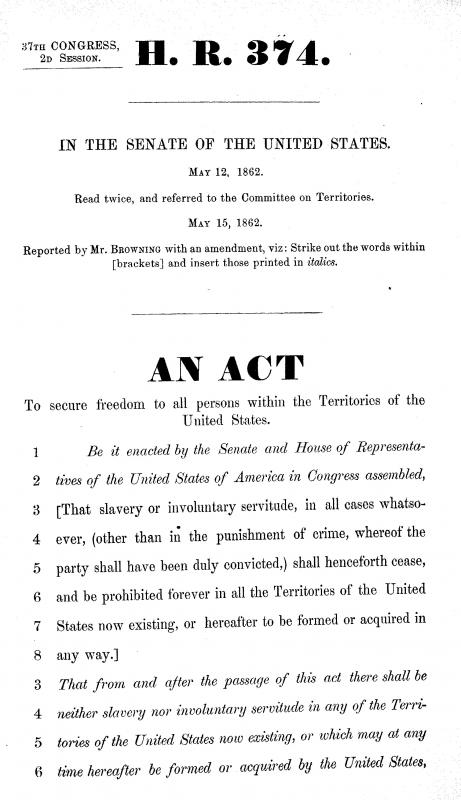7.1 a-b U.S. House of Representatives Bill, outlawing slavery and involuntary servitude in all U.S. territories
The United States Congress outlaws slavery and involuntary servitude in all U.S. territories, June 20, 1862
Documents Introduction
On June 13, 1862, John M. Bernhisel, Utah Territory’s delegate to Congress wrote to Brigham Young to fill him in on legislative happenings in Washington D.C. Bernhisel informed Young of his ongoing efforts to win statehood for Utah and told him of other political matters then playing out in the nation’s capital. Sandwiched in between an update on Bernhisel’s effort to secure financial compensation for Young’s claims on his “Indian accounts” and information on newly approved U.S. mail routes in Utah, Bernhisel told Young that “Congress has passed a bill abolishing slavery in all the Territories of the United Sates, and only requires the sanction of the Executive to become a law.” He also let Young know that “The polygamy bill has passed both Houses” of Congress.[1] Young thus learned that within weeks of each other, Republicans in Congress had made good on their 1856 pledge to “prohibit in the territories, those twin relics of barbarism, polygamy and slavery.”[2]
On June 20, President Abraham Lincoln signed into law “An Act to secure freedom to all persons within the Territories of the United States,” and in doing so he freed Utah’s remaining slaves (Document 7a). On July 2, the LDS Church owned Deseret News reported that fact on page four (Document 7b). There was no banner headline or extensive story about what the law’s passage meant to Utah’s enslavers or those they enslaved. There were no instructions that accompanied the news; LDS leaders or government officials did not tell Utah’s enslavers to emancipate their slaves or in any way establish guidelines or expectations. There was no sense of relief or feelings of joy expressed over the legal end of slavery in the territory. In fact, the announcement in the Deseret News would have been easy to miss altogether. It was published on page four, tucked into the middle of a column titled “From Washington,” with no fanfare or commentary whatsoever. Nothing drew the reader’s eye to the column and no sense of adulation accompanied the report. The paper simply informed its readers that the “President approved the bill prohibiting slavery in the Territories.” That was it.
There is no surviving evidence to indicate how or when news of the law’s passage might have made it into the hands of the territory’s enslavers, let alone into the hands of those whom they enslaved. There is no indication to date as to how or when Utah’s remaining enslaved population actually gained their freedom. The July 2 newspaper article is the earliest public announcement of the new law, but thus far the written record offers no indication of a concerted effort to communicate news of freedom to the people to whom it mattered most, the territory’s enslaved women and men. Thus, the congressional law marked an end to Utah’s decade long legalization of servitude, even if its end in practice remains obscure.


